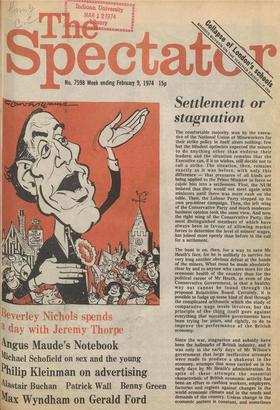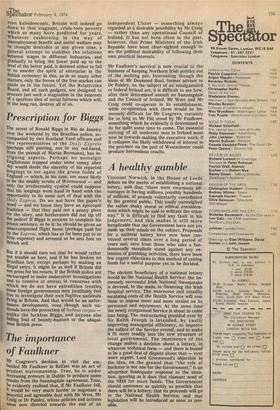Settlement or stagnation
The comfortable majority won by the executive of the National Union of Mineworkers for their strike policy in itself alters nothing: few but the blindest optimists expected the miners to do anything other than endorse their leaders; and the situation remains that the Executive can, if it so wishes, still decide not to call a strike. The situation, then, remains exactly as it was before, with only this difference — that pressures of all kinds are being applied to the Prime Minister to force or cajole him into a settlement. First, the NUM insisted that they would not meet again with ministers until there was more cash on the table. Then, the Labour Party stepped up its own pro-miner campaign. Then, the left wing of the Conservative Party and much moderate business opinion took the same view. And now the right wing of the Conservative Party, the most distinguished members of which have always been in favour of allowing market forces to determine the level of miners' wages, has joined more openly than before in the call for a settlement.
The hunt is on, then, for a way to save Mr Heath's face, for he is unlikely to survive for very long another obvious defeat at the hands of the miners. What must be made absolutely clear by and to anyone who cares more for the economic health of the country than for the political career of Mr Heath, or even of the Conservative Government, is that a healthy way out cannot be found through the proposed Relativities Board. Certainly, it is possible to fudge up some kind of deal through the complicated arithmetic which the study of comparative wage levels involves, but the principle of the thing itself goes against everything that successive governments have been trying for years, and rightly, to do to improve the performance of the British economy.
Since the war, stagnation and subsidy have been the hallmarks of British industry, and it was only in the early days of Mr Wilson's government that large ineffective attempts were made to produce a shakeout in the economy, attempts that were carried on in its early days by Mr Heath's administration. In spite of these attempts the essential characteristic of British economic activity has been an effort to cushion workers, employers, factories and regions against changes in the world economic climate and in the needs and demands of the country. Unless change in the economic pattern is constant, and sometimes even kaleidoscopic, Britain will indeed go down to that stagnant, crisis-torn poverty Which so many have predicted for years. Whatever cushioning in the way of unemployment benefit and social welfare may be thought desirable at any given time, a general attempt to stabilise the relations between wages in different industries, and gradually to bring the lower paid up to the level of the better paid, is doomed either to fail or to murder the spirit of enterprise in the British economy: in this, as in so many other matters, only the forces of the free market can guide us in the future. Yet the Relativities Board, and all such gadgets, are designed to Procure just such a stagnation in the interests of a spurious idea of social fairness which will, In the long run, destroy all of us.
Prescription for Biggs
The arrest of Ronald Biggs in Rio de Janeiro over the weekend by the Brazilian police, accompanied by two Scotland Yard officers and two representatives of the Daily Express (perhaps still panting, not to say red-faced, from the pursuit of Martin Bormann), has intriguing aspects. Perhaps no nostalgic Englishman trapped under some sunny alien Sky would doubt the sincerity of his reported longings to see again the green fields of England — which, in his case, are more likely to be the muddy scrubs of Wormwood — and only the irredeemably cynical could suppose that his longings went hand in hand with the Opportunity to do some sort of deal with the Daily Express. Do we not have the paper's word — and we know they have an episcopal tradition — that they paid not a penny piece for the story, and furthermore did not tip off the police? If Biggs is anxious to complete his Prison sentence, so be it: he should be given an unaccompanied flight home (perhaps paid for by the Express, which has so far been put to so little expense) and arrested as he sets foot on British soil.
But if it should turn out that he would rather not trouble us here, and if he has broken no Brazilian law, except perhaps by making an illegal entry, it might be as well if Britain did not press for his return. If the British police are encouraged to make undercover investigations and to connive at arrests in countries with Which we do not have extradition treaties„ some foreign governments may justifiably feel free to investigate their own fugitive nationals living in Britain. And that would be an unfortunate development, even though such nationals have the protection of habeas corpus — unlike the luckless Biggs, and anyone else falling foul of bounty-hunters or the ubiquitous British press.
The importance of Faulkner
Mr Cosgrave's decision to visit the embattled Mr Faulkner in Belfast was an act of Prudent statesmanship. True, he is under Increasing pressure in Dublin to produce some results from the Sunningdale agreement. True, be evidently realised that, if Mr Faulkner fell, It would be very much harder to negotiate a Peaceful and agreeable deal with Mr West, Mr Craig or Dr Paisley, whose policies and actions seem now directed towards the end of an independent Ulster — something always regarded as a desirable possibility by Mr Craig — rather than any operational Council of Ireland. It has not been often in the past, however, that Prime Ministers of the Irish Republic have been clear-sighted enough to see the political desirability of following their own practical interests.
Mr Faulkner's survival is now crucial to the business of keeping Northern Irish politics out of the melting pot. Interesting though the ideas of Mr Desmond Boal, former adviser to Dr Paisley, on the subject of an amalgamated or federal Ireland are, it is difficult to see how, after their determined assault on Sunningdale and the Council of Ireland, Mr West and Mr Craig could co-operate in its establishment, while co-operation with them would be immensely difficult for Mr Cosgrave, certainly for as long as Mr Fitt stood by Mr Faulkner, something which he evidently is determined to do for quite some time to come. The essential striving of all moderate men in Ireland must now be towards making the executive work: if it collapses the likely withdrawal of interest in the province on the part of Westminster could produce horrendous results.
A healthy gamble
Viscount Norwich, in the House of Lords debate on the merits of establishing a national lottery, said that "there were enormous advantages in having millions, possibly hundreds of millions, of pounds voluntarily contributed by the general public. This easily outweighed the rather shaky moral or ethical considerations which might be said to militate the other way." It is difficult to find any fault in his judgement, and this makes it still more inexplicable that the Government have not yet made up their minds on the subject. Proposals for a national lottery have now been canvassed several times over a long period of years and, save from those who take a fundamentally moralistic stand against any extension of gambling activities, there have been few cogent objections to this method of raising funds for a useful purpose yet to be decided.
The obvious beneficiary of a national lottery would be the National Health Service: the immensely successful Irish National Sweepstake is devoted, in the main, to financing the Irish hospital service. The enormous and steadily escalating costs of the Health Service will continue to impose more and more strains on its personnel and equipment. At the same time the newly reorganised Service is about to come into being. The restructuring presided over by Sir Keith Joseph is intended, by vastly improving managerial efficiency, to improve the calibre of the Service overall, and to make it fit more readily into the new structure of local government. The imminence of the change makes a decision about a lottery, in whatever technical form — and there is bound to be a good deal of dispute about that — ever more urgent. Lord Greenwood's objection to the idea, on the ground that "the role of huckster is not one for the Government," is an altogether inadequate response to the situation, ignoring as it does that clamant need of the NHS for more funds. The Government should announce as quickly as possible that there will be a lottery; that its proceeds will go to the National Health Service; and that legislation will be introduced as soon as possible.



































 Previous page
Previous page